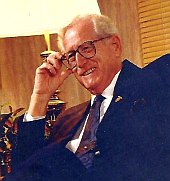 One hundred years ago on February 26, Otis R. Bowen was born in Fulton County. No one knew what the future held for him.
One hundred years ago on February 26, Otis R. Bowen was born in Fulton County. No one knew what the future held for him.
Now, every February 26 is known as “Doc Bowen Day.” February 26 was declared “Doc Bowen Day” in 2014 by the town of Bremen to honor the memory of the late Dr. Otis R. Bowen, Indiana Governor from 1973 – 1981 and Secretary of Health and Human Services under President Ronald Reagan from 1985 – 1989.
Although Bowen passed away five years ago, the tradition will continue so that future generations will always know of him and his accomplishments.
Bremen Community Cares is proud to announce another celebration of “Bowen Days” this month in Bremen. At noon on what would’ve been Bowen’s 100th birthday, at least three churches will toll 100 times. The churches include Bremen United Methodist Church, the old St. Paul’s Lutheran Church, and the First United Church of Christ.
Flags will be flown in downtown Bremen the week of Feb. 20th, along with a display of colored portraits by St. Paul’s Lutheran School and Bremen Elementary School students.
 A special birthday party lunch will be held at Community Hospital of Bremen on Friday, the 23rd. The hospital cafe menu will feature meatloaf, mashed potatoes and baked beans, Doc’s favorite meal, according to his wife, Carol. Free cookies, which Bowen preferred over cake, will be available while supplies last.
A special birthday party lunch will be held at Community Hospital of Bremen on Friday, the 23rd. The hospital cafe menu will feature meatloaf, mashed potatoes and baked beans, Doc’s favorite meal, according to his wife, Carol. Free cookies, which Bowen preferred over cake, will be available while supplies last.
The green glasses posters in windows downtown are for awareness/recognition of the “holiday,” too. Bowen was well-known for his black framed glasses.
At noon on Feb. 26, the town’s proclamation (regarding the establishment of “Doc Bowen Day) will be read aloud at the town hall.
Attached is a story, “A Boy Named Otis,” written by Linda Mullen Clevenger, specifically for children in the fourth grade. In Indiana fourth grades across the state, study Indiana history.
A BOY NAMED OTIS
By Linda Mullen Clevenger
Ten-year-old Otis spent his summer days like most boys did in Fulton County, Indiana, in 1928.
He entered hogs and cows in 4-H contests and he played basketball with the barn as a backboard. He and his older sister, Esther, pulled a wagon door-to-door to sell milk in glass quart bottles for five cents to their neighbors.
His family was poor then, but he did not know it. Otis thought his family had everything. When they needed something, they worked and earned money to buy it. Otis’s parents, Vernie and Pearl Bowen, worked hard so their family could enjoy life.
The Bowen children learned when they tried hard, they had the most fun. Some people think it is not fun to work hard. Otis learned that if he learned all of his spelling words, it was fun to be in spelling contests. He practiced his piano lessons and learned the songs well, so he liked playing the piano. By shooting basketballs with his little brother at home, he became a better player at school.
Otis tried not to show-off when he was good at something. When he started to feel like he was the best, he would quickly be reminded that he was not. One day, he was showing off in the barn, fell, and broke his arm. Another time, he told his family he was the best speller but then lost the spelling bee.
Another time, he and his cousin, John, wanted to travel. They hitchhiked and then hid on a boxcar. They rode the train to Chicago. When they were spotted by railroad guards, they were sent home.
In the 1920s, television and computers did not exist and the Bowens could not afford a radio. For fun, the family sang around the piano and played dominoes or card games like “Rook.” They did not have a pool but swam in the horse’s water tank. They also played croquet and pitched horseshoes.
Otis liked playing baseball with his friends at a one-room school in Fulton County called “Dead Man’s College.” The school was on top of an old, abandoned cemetery at the intersection of 700N and 500 W. Students said one grave was under the front steps. Some of the old tombstones were scattered around the playground. Otis and his friends used them as bases.
Otis loved basketball, too, and wished he could play some day at Indiana University (I.U.) He was not tall so he practiced hard at things that did not require long legs. He learned to steal the ball from others and improved his long shot. Otis was a good player in high school and tried out for the I.U. team. He was not picked. Just trying was fun.
The Bowen family often visited relatives. Otis loved going to his grandparents’ house where he was born. He loved winding-up their Victrola and playing to records. His favorite song was “Stars and Stripes Forever.”
Grandma Bowen played a fun game with her grandchildren. When they came, she would put a pie in the kitchen window to cool. She knew the boys would “steal” it. She pretended not to know they had eaten it. When it was gone, Grandma Bowen would say, “Did someone steal my pie again?” The children always laughed.
On Mondays, the Bowen children helped their mother with laundry. They filled two washtubs with water. In one, they scrubbed clothes with lye soap. The soap was made by their grandparents. The other tub was used to for rinsing. After wringing the clothes, they hung the clothes outside to dry.
In the summer, laundry was done in the yard so the sun would warm the water. Clothes were washed less often in the winter and were hung to dry in the kitchen. The Bowen children had only two or three outfits to wear. They were careful not to get them dirty and wore them longer between washings. Otis could fit all of his clothes into one small suitcase.
Saturday was the day Otis took his weekly bath. Every Sunday, the family went to church together. The girls always wore dresses and the boys put on their nicest clothes. These outfits were called their “Sunday bests.”
From 1929 until 1939, the United States was in a period called “The Great Depression.” Many people lost their jobs. Some families were very poor. The Bowen children sometimes worked with their parents to earn money to pay the rent and to buy food. When they worked together as a family, the money earned was used for the family.
When he worked alone, Otis was permitted to keep the money he earned. He dreamed of being a doctor and knew he would be responsible for paying for college. He worked as much as he could to save. He milked cows, shocked wheat, mowed grass, and pumped gas. If he earned 50 cents a day, he felt like he was walking on clouds.
Out of every dollar earned, Otis saved 75 cents. He put the money in the local bank so he would not spend it foolishly. He hoped to get a scholarship to help pay for college. He always made the honor roll in high school but he did not get a scholarship.
School was very important to the Bowen family. They helped their father prepare for classes, attended classes and swept the gym after school. At home, they played make-believe school. Otis and Esther taught their younger brother Dick, and little sisters, Evelyn and Sarah Jane.
The Bowen children loved going to school. The school year ended in April and started in September to allow children help with farming. Sometimes, Vernie was the only teacher in a one-room schoolhouse, teaching grades one to eight.
Every summer for 17 years, Vernie worked for his teaching license at Valparaiso University and Manchester College. His children saw him teaching long days and studying late into the night. Vernie also found jobs stacking straw, digging potatoes, and picking pickles. As the eldest son, Otis had more responsibilities when his father was away. He did more chores than the others did, and helped his mother with the younger children.
Otis was a good student and was liked by his classmates. In high school, he was elected class president every year. He would later win 26 local and state elections, become governor of the State of Indiana, and a member of a president’s cabinet.
While Otis was a senior at Francesville High School, his Grandma and Grandpa Bowen died just a week apart. After graduating in 1935, Otis chose to attend I.U. in Bloomington. It was where he wanted to be but he almost quit because he was so homesick. He missed his family, especially his grandparents. When he went home for the fall break, Otis talked about quitting school.
Vernie Bowen talked Otis into returning to school so he could become a doctor. Vernie and Pearl knew that a college education would lead their children to better lives.
College was not always easy for Otis but he was happy he did not quit. Once he got a “smoke-up” in zoology, warning him that he may fail. He wanted to study humans, not animals. He improved the zoology grade to a B+ by studying harder.
To pay for college, Otis worked many jobs. He was a waiter, typed papers for other students, and helped an English teacher do research. In the summers, he milked cows, plowed fields, and painted houses. One time, he cut up a pair of blue jeans to make a carrier for his heavy medical books. Other students liked the carrier so much that Otis asked his mother to make more. He sold them for $1.50.
His most unusual job was “cadaver boy.” Sometimes when people died, their families donated the bodies to the I.U. School of Medicine. His job was taking care of the bodies and taking them to classrooms for students to study.
While Otis was in college, his parents moved to Crown Point so Vernie could teach at a high school. The principal of the school invited Otis to his house for dinner. At that dinner, Otis met a young woman named Elizabeth Steinmann and they played a game of “Pick-up Sticks.”
The two started dating and five weeks later, Otis asked Elizabeth to marry him. He called her “Beth” and she called him “Otie.” They could not afford to get married because his college cost so much. For the second time, Otis thought about quitting school. He was out of money and wanted to get a job so they could be married sooner.
Beth was angry about this. She told Otis, “I want to marry a doctor.” Beth inherited some money from her father and insisted that Otis use it for school.
On February 25, 1939, the day before his 21st birthday and about eight months after he proposed, Otis married Beth. He returned to college the next day and graduated with honors later that spring. He went home to see Beth for the summer, but he still faced three years of medical school.
They spent the summers of 1939 and 1940 together but lived apart for most of the first two years of their marriage. During this time, he hitchhiked home every two months to see his wife.
World War II began by 1940. President Franklin D. Roosevelt required all young men in America to register with the new Selective Service System. From that list of names, men were drafted to the armed forces to protect the country. Otis did not wait to be drafted. He joined the Army.
The Army wanted Otis to finish medical school before reporting to duty. Doctors were always needed to treat injured soldiers in battle. His internship at Epworth Hospital (now called Memorial Hospital) in South Bend lasted two more years. Other interns called him, “Buzz.” His Army buddies called him “Doc,” a nickname he kept for the rest of his life.
On June 3, 1943, Doc received his medical degree, and became a first lieutenant in the U.S. Army. The Army moved him often, first to Pennsylvania, then California, Texas, Washington and Hawaii.
Beth moved with him whenever she could. While living in Texas, Doc and Beth learned she was pregnant with their first child. At about the same time, the Army sent Doc to the state of Washington and then to Hawaii for jungle training to prepare for duty in Okinawa, Japan.
Beth returned home to Crown Point. On August 19, 1944, Doc received a telegram announcing his son’s birth. Beth sent him pictures in the many letters she wrote, but Doc did not meet his son until Rick was almost two years old!
World War II ended in 1945 and Doc was discharged from the Army in 1946. He and Beth wanted to live in Indiana. They looked at many cities but chose to live in Bremen. They liked the town and the town needed doctors.
Doc and Beth moved first to a small house at 110 South Montgomery Street in Bremen but quickly outgrew it.
By 1952, the Bowens had four children: Rick, Judy, Tim, and Rob, and moved to a very large house at 304 North Center Street. Today, people call that house, “The Bowen Mansion.” It has five floors: The basement, the main floor, a second floor, a third-floor ballroom, and an attic.
Doc and Dr. Earl Cripe both arrived in Bremen on the same day in 1946. The nearest hospitals were more than fifteen miles away in Mishawaka or Plymouth. The doctors quickly realized a hospital was needed in Bremen. A year later, the Brethren Church converted a nursing home into a hospital and Doctors Bowen and Cripe were the first doctors. That hospital later became Community Hospital of Bremen.
Doctors often treated patients in their own homes at this time. Women sometimes gave birth at home, calling for a doctor only if they were having trouble. One Amish woman called Doc every time she was pregnant: Seventeen times! When they could not pay Doc, they took him a living chicken. He was not home when they arrived so they put the chicken in a gunnysack and left it near the garage. When Doc arrived home, he accidentally ran over the chicken!
Many of Doc’s patients were from the Amish community. When they came to his office, Beth spoke with them in German. They felt comfortable with her and this made Doc very popular with them.
At this time, Marshall County doctors took turns serving as the coroner to investigate deaths. Six years after moving to Bremen, Doc was asked by the Marshall County Medical Society to run for this position.
Doc was elected as Marshall County coroner in 1952. He was paid just $600 a year. Doc discovered he liked being in public office.
After being coroner for four years, Doc decided to run for the office of state representative. He loved the State of Indiana and he learned this was a way to help many people at the same time. He chose to be a Republican earlier when he disagreed with some of the views of President Roosevelt, a Democrat.
A representative is elected to go to Indianapolis several months each year to make laws for the people of Indiana. Doc believed a good representative of the people should listen carefully to citizens before making decisions for them.
He won his first term to the House of Representatives in the Indiana General Assembly when he was 38 years old. Doc listened to the people he represented in Marshall, Fulton, and Starke Counties. They showed their approval by re-electing him six times in the next fourteen years.
Doc kept a set of personal rules to follow when he needed to make decisions for the residents of our state. He kept the same rules later when he was solving problems for the country.
Other representatives admired Doc for his honesty and integrity. Doc thought he could serve as the leader or “Speaker of the House of Representatives.” From 1967 to 1972, the other representatives agreed and chose him for this role.
In 1967, Doc believed he was ready to be the leader of the state so he ran for election. At that time, an earlier governor, Edgar Whitcomb, ran against Doc and won. Doc listed all the things he did wrong in the first campaign, as well as the things he did right. He did not give up and in 1971; Doc said he would run for governor again.
During his campaign, the Bowens visited all 92 counties in Indiana. They wanted all Hoosiers to see that Doc wanted to work for everyone. They also did this for the personal pride of seeing the entire state for themselves. Doc and Beth gave hundreds of speeches, rode in many parades, shook thousands of hands, and asked Hoosiers for their votes.
A few times, he walked through muddy fields and across creeks to meet voters who lived in remote places. At one home, he was even bitten by a dog. It was worth it because he met so many nice people. He also saw the beauty of Indiana.
Being so busy, Doc and Beth dreamed of having a country home where they could relax. He wanted to plant trees from all over the state and Beth wanted to grow flowers. The Bowen family began gathering beams and wood from barns that were either falling down or being destroyed. They used this wood to build a home that looked like a ski lodge.
The “Bowen Lodge” was built where Indiana 331 turns south, east of Bremen. The land south of it soon developed as “Donnybrook.”
At their new home, Doc planted a tree to represent each of Indiana’s 92 counties. An American Beech tree stands for Marshall County. A California redwood tree was chosen for Monroe County, home of I.U. and Doc’s beloved Big Red basketball team. A peach tree grows for Hancock County where poet James Whitcomb Riley was born. Riley wrote poems, including one called “The Ripest Peach.”
By the time he finished, Doc planted several hundred trees, including 23 tulip poplars, Indiana’s state tree!
Hoosiers listened to Doc, liked what they heard him say, and elected him as governor in 1972. He defeated former Governor Matthew Welsh by receiving almost two-thirds of the votes! It was a big win for Doc.
At that time, a law limited governors to one four-year term at a time. The governors needed to wait four years before seeking a second term. When Doc was elected governor, the law was changed and he was allowed to seek a second term. When he won again in 1976, he became the first governor in Indiana since 1851 to be re-elected.
Doc wanted to be governor for many reasons. All of them were about serving people. Three of his most important goals were to improve ambulance services, reduce property taxes, and open more state parks. In 1971, the state purchased the farm of Harry and Wanda Kane, near North Liberty, for a state park. The Kane family then moved to Bremen and became friends with Doc.
In his opinion, Doc’s most important accomplishment while governor was the creation of Emergency Medical Services. Before he was governor, many funeral homes provided ambulance service using hearses. Drivers were not medically trained and had no rescue equipment to use. They just drove fast to the nearest hospital. The new EMS law required ambulance workers be trained to provide immediate medical treatment. Doc’s EMS laws saved many, many lives.
Secondly, Doc promised to reduce property taxes and he did. Adults in Indiana pay taxes on the property they own to help pay for schools, courts, libraries, police, fire protection and other government services. Within two years, people in Indiana paid at least 20 percent less in property taxes. His third goal was to open a state park close to every resident in Indiana. While Doc was governor, these state parks were developed:
Potato Creek State Park near North Liberty.
Wyandotte Woods (now O’Bannon Woods
State Park) near Corydon.
Harmonie State Park near New Harmony.
Hardy Lake State Park near Seymour.
White River State Park in Indianapolis.
During Governor Bowen’s terms, the national speed limit was reduced to 55 miles per hour to conserve gas. He supported this because a lower speed limit also reduced the number of injuries and deaths from accidents.
When cars passed him going faster than 55 miles per hour, Governor Bowen would sometimes hold up two hands to show “five” and “five.” Imagine seeing the governor in the back seat giving two “high-fives,” reminding drivers of the speed limit.
Governor Bowen was easy to recognize. His black-rimmed glasses became his trademark.
He held the most important office in the state but Doc and Beth did not feel or act more important than anyone else may. It did not matter if they were meeting a president of a country or a president of a church club. They treated everyone with kindness. They cared about others.
For example, when Beth would get her haircut, it did not matter that she was Indiana’s First Lady. She wanted to help the hair stylist as she always did. After her hair was cut, Beth got up and swept the floor. Others in the beauty shop laughed and told her she was too important to sweep the floors. Beth disagreed.
One snowy night, Doc was in the governor’s office when a woman from the 7400 block of North Meridian Street called to complain that snowplows blocked her driveway with snow. She lived near his home, so Doc decided he would go to her house after work and shovel her snow.
It took about five minutes to clear the driveway. When he was done, he knocked on her door and told her. She was speechless as Doc walked away. He laughed all the way home, thinking about the startled lady, and wondering what she was thinking. The lady was mad at first but he likely won her vote in the next election!
The Bowens lived that way. They swept floors and shoveled snow. They did not expect others to do it for them.
Doc was re-elected easily as governor because Hoosiers liked him so much. He was also getting national attention. At the same time, Beth became ill with cancer and started treatment.
Doc’s second term ended in the same month that President Ronald Reagan was taking office for the first time. President Reagan considered asking Doc be his vice president but Doc quickly said he was not interested. He told the president he might be interested in a position later.
While Doc was honored by the idea, Beth was dying. Doc did not want to move to Washington, D.C., when his wife needed him. He loved her very much. Beth died on New Year’s Day, 1981, just 11 days before Doc’s second term ended. He and Beth were married for 42 years.
The governor’s last days in office were filled with grief and sadness. At times, Doc was so sad that it was hard to talk to people. That was never a problem of his.
Doc was almost 63 years old when he finished two terms as governor. When some people are that age, they retire and stay home. Not Doc.
He was offered several jobs:
•He could return to Bremen and be a family doctor again.
•He could move to Washington D.C. and work with President Ronald Reagan.
•Teaching Family Medicine at the I.U. Medical School was also offered to him.
Residents in Marshall County wanted him to return as a doctor in Bremen. He had not practiced medicine for 14 years and loved being a doctor. However, medicine changed during that time, too. He believed he was not prepared to return as a doctor.
Doc accepted the job at the I.U. so he could teach medicine. He also paid for several friends and family members to attend college, remembering what it was like when he was a student with no money. He also became joined the Lilly Endowment Board and other non-profit groups. During this time, Doc married a Marshall County friend, Rose Hochstetler.
A year later, President Reagan called Doc again. The president knew Doc was a good politician and a medical doctor. He wanted Doc to help him deal with national health issues. This time, Doc said he would help.
President Reagan was so impressed with Doc’s hard work that the president asked him to lead a committee on Social Security. This project was later called the “Bowen Commission.”
In 1985, President Reagan asked Doc to be in his Cabinet as Secretary of Health and Human Services. He was in charge of national health issues, Social Security, and the Food and Drug Administration. Acquired Immune Deficiency Syndrome (AIDS) became epidemic at this time.
As Secretary, Doc was in charge of 120,000 people on his staff and $425,000,000,000! That was more money than the country spent on the military! Also, he continued his passion for medicine just as he did for the State of Indiana. He improved health care for the poor, the elderly, and for people with disabilities in the United States.
During this time, the Bowens traveled to many countries. Rose had never been on an airplane or out of the United States until she married Doc. They saw things like the Great Wall in China and rode elephants in India.
When President Reagan’s term ended in 1989, Otis and Rose returned to Bremen. In a short time, they learned Rose was ill with lung cancer. She died almost three years later in their lodge.
Doc tried to stay busy. He watched I.U. basketball games. He took care of his large yard, and was the guest speaker at many events. His home was a museum of his life. Photographs of politicians and celebrities lined the walls. Elephant statues filled the huge fireplace mantle.
While grieving for Rose, Doc filled about 100 photo albums with photographs of his life. He was ready to retire, but he was not happy being alone.
At a political event, he became reacquainted with an old friend and former patient, Carol Hahn Mikesell. The two enjoyed getting together to talk about old times. He fell in love with Carol, and they were married at the lodge. She brought love, laughter, and joy back to his life.
They also traveled for fun. On a trip to see glaciers in Alaska, a man approached him and said, “Hey, you look like a governor we used to have in Indiana.”
Doc quickly replied, “That’s funny. I used to be a governor in Indiana.” Then he laughed and introduced himself to the surprised man. It was nice to know that he was still remembered about 15 years after he left office.
Doc and Carol built a new home next door to their lodge.
In retirement now, he took on a full-time job of taking care of the lawn and planting new trees and flowers. He remained a life-long fan of I.U. basketball, and continued to work for many charities, and spent time with his family.
As this boy named Otis saw the arrival of the 21st Century, he never forgot the important things in life: love your family, study and work hard every day, and help others.
Linda Mullen Clevenger
 One hundred years ago on February 26, Otis R. Bowen was born in Fulton County. No one knew what the future held for him.
One hundred years ago on February 26, Otis R. Bowen was born in Fulton County. No one knew what the future held for him. A special birthday party lunch will be held at Community Hospital of Bremen on Friday, the 23rd. The hospital cafe menu will feature meatloaf, mashed potatoes and baked beans, Doc’s favorite meal, according to his wife, Carol. Free cookies, which Bowen preferred over cake, will be available while supplies last.
A special birthday party lunch will be held at Community Hospital of Bremen on Friday, the 23rd. The hospital cafe menu will feature meatloaf, mashed potatoes and baked beans, Doc’s favorite meal, according to his wife, Carol. Free cookies, which Bowen preferred over cake, will be available while supplies last.













